Although the Toronto International Film Festival is known generally as a populist festival—not the place for hard-hitting, formally subversive, international arthouse fare—quality cinema is not difficult to find among the hundreds of films programmed across its 11-day schedule. Especially if you’re inclined toward the literary.
This year’s TIFF was striped with bands of literary intrigue, with source material coming from all over: popular contemporary novels, a treasured young adult adventure from the 90s, a controversial political tract, an Italian experiment in narrative, and the life story of a famed novelist, to name a few. I even saw a film (Hlynur Pálmason’s extraordinary Godland) that was based on an imagined series of wet plate photographs discovered on the southeast shore of Iceland. There is a different piece to be written about what the overwhelming white womanishness of these selections says about the literature-to-film pipeline, but for now, what follows is a snapshot of the highs and lows of TIFF’s literary-adjacent films, as seen from the banks of Lake Ontario.
*
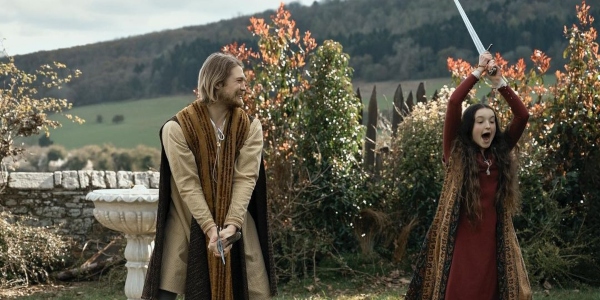
Catherine, Called Birdy
It takes a minute to wrap your head around it, but Lena Dunham and Mikhail Bakhtin really are a match made in heaven. Dunham’s latest film, her second this year after the mellower sexual coming-of-age tale Sharp Stick, is Catherine, Called Birdy, an adaptation of Karen Cushman’s beloved young adult novel of a rebellious girl finding her place in 13th-century England.
Dunham’s career-long obsession with showing her audience what bodies really look like and do is perfectly suited to the era: the film includes a smattering of fart jokes and saucy sexual provocations, Birdy’s mother (Billie Piper) is shown vomiting while giving birth, and Birdy herself (Bella Ramsey) is given ample instructions for proper menstrual hygiene by her nursemaid Morwenna (Lesley Sharp).
And yet in Rabelais and His World, Bakhtin’s influential treatise on the bawdy, bodily Middle Ages, it is not grime, nor fornication, nor excretion that the Russian philosopher designated as the primary sign of the times. It was laughter: “A boundless world of humorous forms and manifestations” governed the lives of common people, “as opposed to the official and serious tone of medieval ecclesiastical and feudal culture.” After a monstrously protracted dark night of the soul, Dunham, who’s been receiving death threats on the internet since 2014, understands better than most the potent contrast of filth and purity, light and dark.
Lena Dunham and Mikhail Bakhtin really are a match made in heaven.Catherine, Called Birdy is all light. With Ramsey’s spectacular lead performance as her rudder, Dunham motors through the film at a dizzying speed, each moment suffused with exuberance, sincerity, commitment, maturity, and insouciance. The effect is not vertigo but effervescence. The film sparkles with wit, as Dunham’s script appropriates the very best of Cushman’s cheeky yet deeply researched prose. “I have been told how babies are made, and I’m afraid I shall perish from revulsion,” Birdy tells Morwenna in a silly early scene—and in a later, more somber one, she remarks in voiceover, “My heart has been shaved and boiled like a parsnip.”
As Birdy defies her father’s (Andrew Scott, in the film’s only slightly weak performance) scheme to marry her off to settle his debts; prays for a younger sibling from her mother, who’s suffered several miscarriages; cavorts around the village with her best friend Aelis (Isis Hainsworth); lusts after her dashing knight of an uncle (Joe Alwyn—“if only he was my cousin!” she cries in one scene); and struggles to “know my own story” (somehow, girlbossery feels good in a film like this), Dunham reminds us—without room for interpretation—what a creative dynamo she is.
*
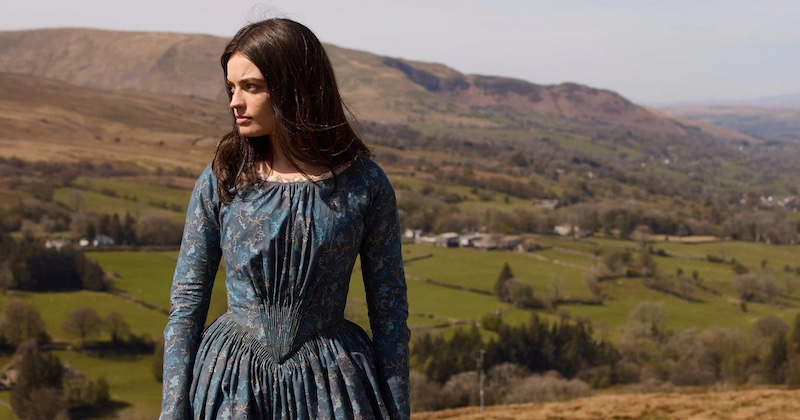
Emily
When the trailer for Frances O’Connor’s Emily was released back in August, the actress-turned-director gave the Radio Times an interview in which she said this of the film’s subject, 19th-century novelist Emily Brontë: “She’s very assured in who she is, and very real, like 100% authentic real.” Upon the premiere of the film at TIFF, she told Screen’s Jeremy Kay, “Like Emily, she’s (star Emma Mackey) very authentic as a person.” And at the screening I attended a few days after the premiere, in her introduction to the eager audience, O’Connor said of her Brontë passion, “She was so authentically herself, and she was just herself.”
Well alright! What hasn’t already been said about the Brontës in the dozens if not hundreds of adaptations of their work and accounts of their lives? Generally, Charlotte is depicted as uptight, prodigious, and intense; Emily is depicted as passionate, rebellious, and anti-social; and Anne isn’t depicted much at all. That holds firm for O’Connor’s Emily, only its portrait of the second youngest sister has been updated to emphasize the Wuthering Heights author’s… authenticity.
Putting aside whatever it means for a mentally ill 19th-century consumptive and fan fiction enthusiast to be “authentic,” Emily does not deserve our ridicule. Does it deserve an audience? Sure. With its tiresome yet in vogue soundtrack of benzo’d out 80s pop covers, its cast of hot, Netflix-looking actors and actual Netflix actors, and all the talk of “finding your voice” and “beautiful scars,” it will fit right in on the platform where it was pre-bought to stream: Amazon Prime. Perhaps Emily does deserve some ridicule. But what it also merits—for it isn’t an entirely worthless inquiry into the life of a famous eccentric—is some honest criticism.
If, like me, you’re still smarting from the bummer of Josephine Decker and Elisabeth Moss’s Shirley Jackson biopic—or really if you’ve seen any film about an author released since Jane Campion’s bar-setting Janet Frame biopic An Angel at My Table in 1990—you’re used to the disappointment of seeing an absolute weirdo you’ve loved your whole life envisioned as a runway model with some facial quirks who didn’t like to go to parties. Why it’s so hard to represent famous intellectuals for who they really were is not a question for Frances O’Connor alone, but it’s particularly dismaying seeing this treatment applied to the likes of Emily Brontë.
For the uninitiated, Brontë once cauterized her own wound with a red-hot poker. She reportedly strangled a dog to death with her bare hands. She wrote poetry that verged on the pornographic, she was a shut-in, likely anorexic, deeply, deeply troubled, but bright, brilliant, with an incendiary voice that took her years to harness. O’Connor’s Emily isn’t dissimilar from this portrait, but she’s simplified and normalized to a degree that makes her recognizable only as a cliche.
And strangely, in this explicitly feminist telling of her life, in which Emily and Branwell (Fionn Whitehead) literally shout “FREEDOM OF THOUGHT!” off a cliff in one scene, Emily’s story is packaged around her broken relationship with the dashing county parson William Weightman (Oliver Jackson Cohen).
When an author’s book is part of the national common core reading list, you can’t really give a watered-down version of their life the “at least it will get young people interested in them!” kudo. Instead, Emily gets thrown atop the Brontë media heap with the generous but passionless commendation: why not.
*
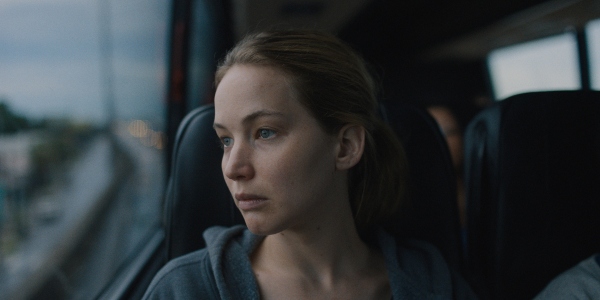
Causeway
If you’re a literary person, the biggest wtf moment of the TIFF schedule drop back in August came along with the announcement of a new Jennifer Lawrence star vehicle called Causeway. It seemed it would be a sobering drama about a veteran’s tough adjustment back to civilian life, directed by prolific theater director Lila Neugebauer, released by Apple TV+, and written by… Ottessa Moshfegh?
With the help of co-writers Elizabeth Sanders and Luke Goebel (Moshfegh’s husband), the renowned gross girl of American letters has written the most straight, sincere, and, for lack of a better word, normal story of her career. And it’s fantastic.
Causeway is a tough yet ultimately rewarding human drama that naturalistically winds its way around some of the deepest and most common issues that regular people face: grief, heartbreak, lack of economic opportunity, the pain of returning home and the fear of leaving it. It belongs to a vanishing type in American cinema, once called “women’s pictures.” In a woman’s picture, as outlined by the great film historian Jeanine Basinger, all the action, intrigue, and atmosphere revolve around one ultimate, hallowed act: the woman in question must make a choice. Usually, between love and work.
In collaborating on Causeway, Moshfegh may have made the most punk, rebellious move of her career.In Causeway, Lynsey’s choice is a bit more complex, but no less essential. While in Afghanistan, working on a dam with the Army Corps of Engineers, Lynsey’s vehicle was bombed, leaving her with serious brain damage. She must return to New Orleans to recuperate, where she mends painful breaks with her freewheeling mother (Linda Emond) and incarcerated, addict brother (Russell Harvard), and—despite stating that she “is only into girls”—embarks on something like a romance with mechanic James (Bryan Tyree Henry). Lynsey strains to run away, to take the easy way out, rushing through her PT so she can redeploy. But as her roots regrow, the choice to leave or stay becomes harder and harder to make.
If Moshfegh’s voice can be heard anywhere, it’s in how textured each character’s voice is, with completely distinct lexicons, grammars, and senses of pace. Moshfegh has always been adept with character, and in collaborating on Causeway, she may have made the most punk, rebellious move of her career: writing something heartfelt, sentimental, and uncool.
*
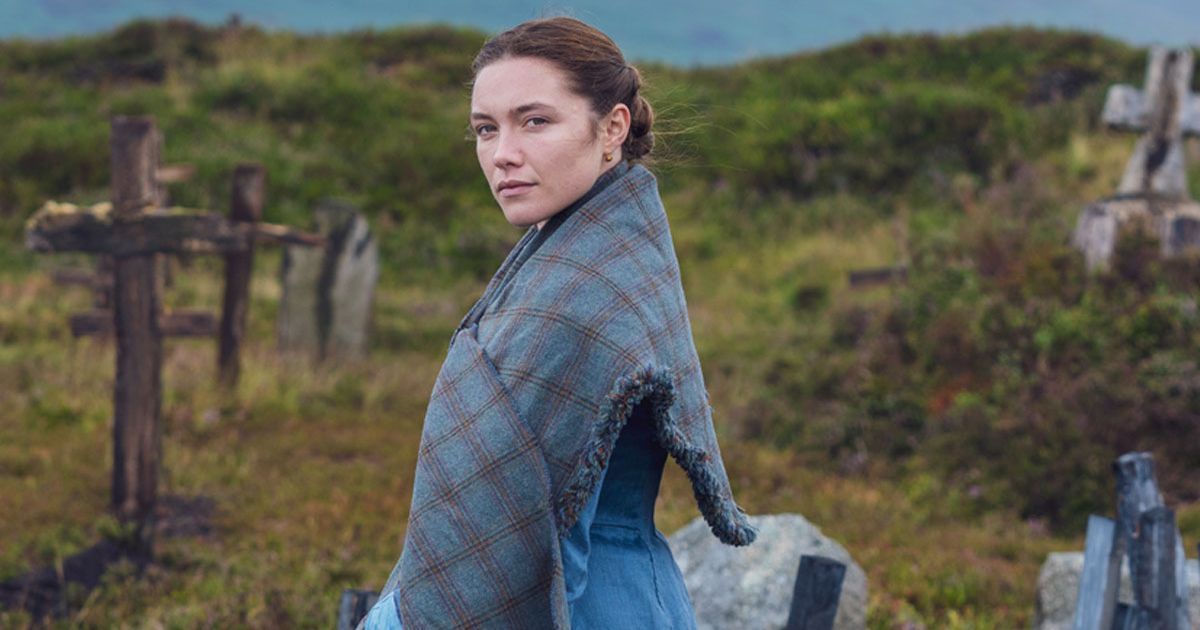
The Wonder
If Emily leaves you wanting for a more incisive and passionate bodice-and-bustle tale set in the UK wildlands, The Wonder will fully scratch that itch. Chilean director Sebastian Lelio has brilliantly adapted Emma Donoghue’s 2016 novel, a ponderous yet winsome story about stories, and an ethical inquiry into the ways communities can sometimes plot the destruction of one of their own—and call it love.
Elizabeth “Lib” Wright (played with characteristic force by Florence Pugh) is an English nurse who, fresh off aiding wounded soldiers in the Crimean war, as well as a series of monumental personal losses, embarks to a rural province of Ireland to investigate a medical mystery. A local nine-year-old named Anna O’Donnell (Kíla Lord Cassidy) has refused food for four months and is starting to be venerated as a saint. “The baby Jesus put a ring on her finger, but only she could see it,” she says of St. Catherine, as she points to her own finger.
The Wonder could easily have been adapted from a novel by Ian McEwan, with its pitting of faith against reason, but mercifully, Donoghue’s source text has a subtler, more seductive undertow than McEwan’s sometimes turgid prose. That shifty lightness carries through into the film, which never comes down in condescension against the faithful or faithless, even as it’s built atop the explosive fault-lines between the English and the Irish following the great famine. Now with two great adaptations of her work (following 2015’s Oscar-winning Room), Donoghue may be on her way to becoming something like the Gillian Flynn of literary fiction.
*
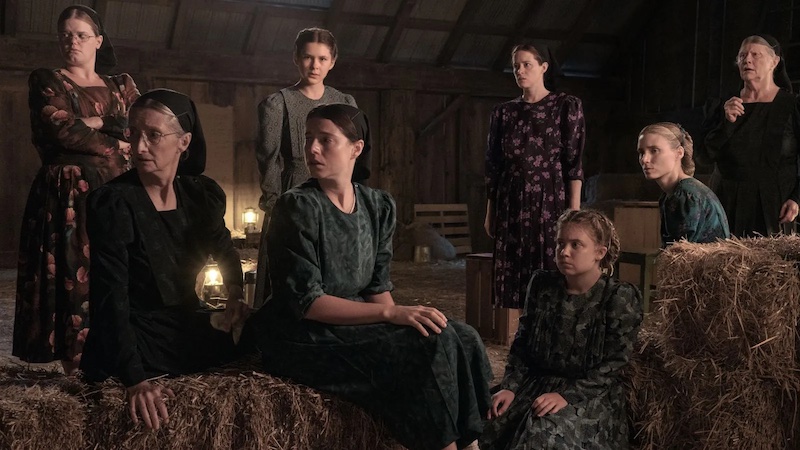
Women Talking
Women Talking, Sarah Polley’s adaptation of Miriam Toews’s 2018 novel, is burdened by the inconceivable horror of its premise. The fact that in 2009, women living in a remote Mennonite colony in Bolivia discover that for years, a group of men had been sneaking into their bedrooms—often their sisters, cousins, nieces, and friends—sedating them, violently assaulting them, and then leaving them to come up with their own explanations (God? The devil? Our imaginations?), is extremely hard to process. It is a crime of such scope, that lasted for so long, dealt an unquantifiable amount of physical and psychological trauma to its victims, and was constituted around the betrayal and perversion of the most primal social bonds we have as humans.
Toews’s novel is an arresting read not because she gets to the bottom of why the crimes happened, how things like this can even happen, or the impact it had on the women, but that it found the perfect form to represent it all. The action takes place over two days, the time between the guilty men being carted off to a local jail and being able to return after bail is posted.
A group of women meet in a hayloft to discuss their options: leave, stay and fight, or do nothing. The conversation is caustic, circuitous, frequently erupting in fights, or tears, or group singing and laughter. The women cut each other off, reiterate the same points, yell at each other for reiterating the same points, and sprinkled throughout are some questions so large, so elemental in their force, they threaten to propel the conversation into an ontological black hole: Does the quality of life on Earth matter, or should the women just focus on getting in to heaven? “Is forgiveness that’s been forced upon us,” the elder Agata asks, “really forgiveness?” And the strange, poetic Ona (Rooney Mara) asks the mother of all questions: Aren’t all the men guilty of the assaults, since they created the conditions in which they happened? And then, aren’t they all also victims, like us?
It’s hard not to see producers’ notes nudging Polley’s first wide release into more conventional territory.The book is deeply discursive, a story about stories, and it is here where Polley’s adaptation falters. Reading the book can be a frustrating experience, and I suspect deliberately so—Toews makes you run in intellectual circles to understand just how unsolvable these women’s issues are. Polley’s film is just frustrating. It is by no means a bad film—it’s artfully staged, gives you a sense of the lively kinetics of the conversation, and Polley is clearly passionate about these women and their worlds.
But something she said in the Q&A following the premiere unlocked the thread between all the film’s baffling choices—its ugly, muted color palette; that the landscape on which the women live and work is frequently blurred and cut away from; the fact that the word “Mennonite” is never used; and the fact that the book’s narrator, the male interloper August Epp (Ben Whishaw), has been swapped out for an invented character, seemingly the future friend of Ona’s unborn child. “I didn’t want people to be able to say, ‘Oh, this only happened to these women.’ I wanted anyone to be able to relate to it,” Polley said.
I want to believe that Polley generalized the story so that those who needed it might find it and heal. But it’s hard not to see producers’ notes nudging Polley’s first wide release into more conventional territory. Is it not a maxim that the more specific a story, the more universal it is? And why erase the color from their world and hide the land they live on and may have to leave behind? So that Susan from Milwaukee doesn’t feel alienated?
Women Talking is a good film; it gets the basic point across. But what the real women these characters are based on endured is anything but basic. To render it without its complex specificity is to once again take their stories out of their hands.



